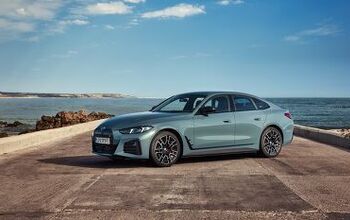Grey Power: Former Chrysler Suits Sue Former Chrysler Owners

A long time ago, I was told a little phrase which stuck with me: “Sometimes, you may be done with history, but history isn’t done with you.” It made a lot of sense to me. Just because you’ve finished with something doesn’t mean it’s over for the other party. Seems like Daimler and Cerberus are learning this the hard way.
Associated Press (via Google News) is reporting that more than 450 former Chrysler executives, including turnaround artiste Lee Iacocca, are suing Daimler and Cerberus. The suits say in the suit that they lost $100m in pensions in Chrysler’s bankruptcy. Sheldon Miller, one of the lawyers working on the case, said that supplemental pensions were not transferred to the new Chrysler during its bankruptcy and “as a result, each of the plaintiffs lost large percentages of their earned retirement pensions.” Hmmm, when rank and file members lose benefits, it’s collateral damage to help the company stay strong. When executives lose benefits, it’s lawsuit time.
$100m needs deep pockets, so the boys in Stuttgart, Daimler, were not forgotten in this affair. The lawsuit mentions that Daimler failed to protect the pensions properly. They could have, as posited in the suit, converted the pensions into annuities to protect them. Why does the suit say this? Because Daimler did do this in 2005 for active executives when Chrysler started showing failings.
However, this suit is retrospective. It is not being filed against “New” Chrysler. It’s filed againt Daimler and Cerberus. Suddenly, Mr Miller turned into a “bailout” cheerleader. “Everybody involved in this suit loves that company (“New Chrysler”) and like everybody else wants to see it succeed,” said Mr Miller, “The plaintiffs in our case are trying to assure that there won’t be similar hardships for Chrysler’s current employees, many of whom worked for and with the people involved in this suit.” OK, a couple of problems with this statement.
1. They’re only doing this lawsuit so there won’t be similar hardships for current Chrysler employees? So, it’s got nothing to do with the $100m they’re trying to claim back?
2. “The plaintiffs in our case are trying to assure that there won’t be similar hardships for Chrysler’s current employees…” “Similar hardships”? Does he think that a certain company may go bankrupt again? Nah, of course not! I’ve got to stop reading TTAC. I’m becoming too cynical…am I?

More by Cammy Corrigan
Latest Car Reviews
Read moreLatest Product Reviews
Read moreRecent Comments
- SCE to AUX Maybe some Apple tech would be helpful, but please no self-driving stuff.
- SCE to AUX It's over, and over the last decade or so Henrik Fisker has left two eras of foolish customers driving paper weights.
- Kwik_Shift_Pro4X Always a good sign. 🤕 I would like to see their pitch on Shark's Tank/Dragon's Den
- Buickman I was called crazy after predicting the sale of GMAC.#canthurtme
- 3-On-The-Tree Another observation during my time as a firefighter EMT was that seatbelts and helmets do save lives and reduce injury. And its always the other person getting hurt.

































Comments
Join the conversation
I am glad that someone is going after these bast**ds. The absolutely shameful treatment of what was once a great company needs to be addressed, even if only in this small way. For years I have railed against the treatment Chrysler received from both Daimler and Cerberus, while they raped and pillaged their way through this enterprise, all without any real consequences, thanks to media silence on the subject, TTAC included. I'd like to see the workers who were screwed do exactly the same thing. Daimler and Cerberus should not be allowed to promulgate such shoddy business practice without some sort of penalty. I have ZERO sympathy for these greed merchants.
Won't fly. Execs must be at risk in a bankruptcy in their uninsured plan.